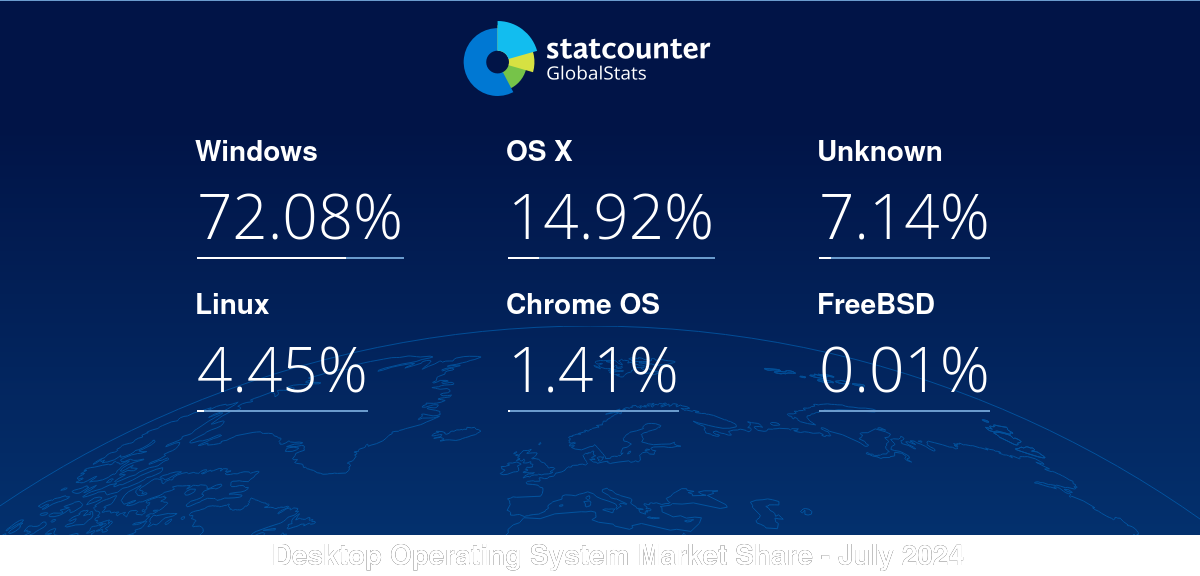My Windows 10 install shat the bed so I’m trying Linux Mint again.
It’s crazy how a computer can feel brand new again when 50 different pieces of bloatware aren’t trying to all start on boot.
The gaming situation is so much different now with Steam Play and Proton. Although I’ve found that just because a game is Steam Deck Verified, it doesn’t necessarily mean it’ll work the first try.
I installed PopOS last year after I got fed up with bloatware, adds, and just outright annoying “notifications” in windows 10 and 11, and I haven’t looked back.
I found a great resource in the ProtonDB website for configuring proton settings as I have also occasionally had games not work properly that are steam deck verified. There are typically enough people posting how they overcame issues and their build components so you can try to match up their fixes with your computer parts. It helps a ton most of the time.
Yeah ProtonDB is great but it doesn’t always have a fix.
For example, Powerwash Simulator is Steam Deck Verified and has a Platinum rating and most people are like “runs great out of the box, no problems”.
However, when I tried it, the screen would blank every second until I managed to put the game into windowed mode, and then the lower portion of it was concealed behind the app panel.
This was on a fresh Linux Mint 22 install with the latest proprietary Nvidia drivers.
Also, you can’t install most games until you enable “Steam Play on all titles” which I had to figure out myself.
Installed Bazzite myself yesterday and yeah it feels like I bought a new PC without having actually spent the money XD
Didn’t realize how big it was in India, 16.21%!
Kerala have a big contribution to this since all the school IT labs + government offices here use ubuntu or its slightly modified versions. Wish if every state did so.
Everything I hear from India is generally pretty negative news with the exception of basically anytime Kerala is mentioned.
Technological sovereignty
Yup, we don’t need big corporations for nada.
In Norway it’s 29.1%
I honestly don’t know how to think about this. On one hand, it’s pretty cool that more and more users are giving the finger to Microsoft and switch to Linux.
On the other hand, Linux systems are gonna become a bigger target for cyberattacks or malware. I realise that I, as a regular person who isn’t on dodgy porn sites all day, probably have nothing to fear but still, I like my Linux lightweight and if they have to slap some antivirus on there… eh idk
Don’t fret! 95+% all servers on the internet run Linux so the attack vector has been there for ages. Follow best practices and your risk will remain low!
Unfortunately there’s a lot more to it than that.
You’re right that the “back end” of Linux systems tend to be quite hardened.
It’s the desktop environments that are a concern when it comes to security hardening, IMO. Almost all servers have no DE installed so it’s not something enterprise has cared about.
How much effort has been put into security on DEs? I honestly have no idea, but so far there hasn’t been an enormous pressure to security harden them.
Shit, look at:
-
X11. It’s insecure by design, yet most distros still ship with it (understandably, since Wayland isn’t 100% yet).
-
packaged software runs as root during the whole installation period - this means that anything slipped into the install script will have full root privileges to do anything to your system. Flatpak does fix this, but normally-packaged software is still abundant.
-
any non-root program can change aliases in your bashrc or bash_aliases file. I.e. they can change “apt install” to some other nefarious command, or to point to a dodgy software repository, so that next time the user types “sudo apt install [XYZ]”, it downloads malware or does other nasty things.
I’m absolutely clueless about this stuff and I can come up with those potential attack vectors in seconds. Imagine what a proficient hacker could do, or a hostile nation-state.
I definitely think improvements will have to be made in terms of security, and we’re no doubt going to hear more about malware in the coming years. But it’s not an insurmountable problem, IMO. Distros and DEs will just take time to adapt.
X11. It’s insecure by design, yet most distros still ship with it (understandably, since Wayland isn’t 100% yet).
This is a bit overhyped.
packaged software runs as root during the whole installation period - this means that anything slipped into the install script will have full root privileges to do anything to your system. Flatpak does fix this, but normally-packaged software is still abundant.
WTF? Things that run as root, do. Things that don’t, don’t. Obviously most things don’t.
any non-root program can change aliases in your bashrc or bash_aliases file. I.e. they can change “apt install” to some other nefarious command, or to point to a dodgy software repository, so that next time the user types “sudo apt install [XYZ]”, it downloads malware or does other nasty things.
For your own user, so what?
EDIT:
But it’s not an insurmountable problem, IMO. Distros and DEs will just take time to adapt.
Actually it is. One can make levels over levels of isolation, sandboxes and more sandboxes, but in the end conscious hygiene matters most.
This is a bit overhyped.
No, it isn’t. If anything it’s the opposite.
Under X11, any program of any kind can see the contents of another program.
Under X11, any program of any kind can see all your keypresses, whether the app is focussed, unfocused, minimised, on another virtual desktop. Anything.
Under X11, any program can inject keypresses into any other program.
Under X11, any program of any kind can access your clipboard.
And it doesn’t even take root privileges. That’s just the default.
The X11 system itself runs as root, though. And this opens the door for privilege escalation exploits.
That’s before we even consider the devs themselves saying that the complexity, decades of spaghetti code, and unfixable bugs make it virtually impossible to patch.
X11 is a security nightmare of epic proportions. An absolutely cataclysmically insecure system. And it’s one of the main reasons that X11 devs abandoned it for Wayland.
WTF? Things that run as root, do. Things that don’t, don’t. Obviously most things don’t.
I never said that things that don’t run as root run as root. That doesn’t make sense, it’s self contradictory.
What I said was that install scripts for repo packages always run as root. And therefore anything that makes its way into the script will be executed with root privileges. That is a risk.
For your own user, so what?
What do you mean, “so what”?! A non-root program being able to highjack system commands and even gain root access isn’t “so what”, it’s a glaring security hole.
Actually it is. One can make levels over levels of isolation, sandboxes and more sandboxes, but in the end conscious hygiene matters most.
You’re right, but you’re taking my words there a little too literally there.
When I say the problems aren’t insurmountable I mean “with effort, a lot of these will be fixed and your system will be pretty secure”, not “one day Linux systems will literally be unhackable, and no exploit or security issue will ever be found again. Security problems will be a thing of the past.”
Under X11, any program …
This would be the same as under Windows, no?
The X11 system itself runs as root, though. And this opens the door for privilege escalation exploits.
It usually does, but it doesn’t have to.
That’s before we even consider the devs themselves saying that the complexity, decades of spaghetti code, and unfixable bugs make it virtually impossible to patch.
And the new thing to replace that is still not good enough after 10 years or so.
I said that install scripts for repo packages always run as root. And therefore anything that makes its way into the script will be executed with root privileges. That is a risk.
Let’s please not extrapolate the problems of your distribution to all of them.
What do you mean, “so what”?! A non-root program being able to highjack system commands and even gain root access isn’t “so what”, it’s a glaring security hole.
Your user may set aliases for the shell of your user, and the program\script ran by your user can do that.
It’s not a security hole at all. It’s something you should be able to do for any normal use.
This would be the same as under Windows, no?
In short, no not really for modern windows versions, in almost all cases.
Although I don’t find “well Windows does it so it must be alright” to be a great argument anyway. When someone says “top notch security”, Windows isn’t the first thing that springs to my mind.
It usually does, but it doesn’t have to.
Hypothetically yes, but in every single distro out there that I’ve seen no. And most people don’t build their own from scratch.
And the new thing to replace that is still not good enough after 10 years or so.
Not in all cases, no. There are fringe usecases still being worked on. I’ve been using it since 2016 just fine, but my sister, who is reliant on screen readers, hasn’t been able to.
Like I said, things are being worked on. This is kind of derailing the conversation away from security, though. I was talking about security.
Let’s please not extrapolate the problems of your distribution to all of them.
No. It is all of them. It’s a problem with all Debian-based distros, Fedora, SUSE, Arch, you name it. Installer scripts run with root privileges.
Your user may set aliases for the shell of your user, and the program\script ran by your user can do that.
Yes… then when you run sudo thinking you’re using whatever command, it can run something entirely different. How don’t you see that as a problem?
It’s not a security hole at all.
WHAT?! Any program, without root privileges, being able to tamper with what commands do, and gain full root access to your system, “is not a security hole at all”??
So you download, say, a text editor. Except it’s been compromised (although you don’t know it). That program alters the sudo command by aliasing it to execute a curl command that encrypts your drive and shows a message that if you send ABC amount of bitcoin to XYZ wallet, then you get the decryption key.
You run sudo for any reason, e.g. to edit your fstab file, do a system update, install a package, anything, and you type your password at the prompt as usual. Unbeknownst to you, you didn’t actually just run sudo plus your intended command, you just ran that aforementioned curl script, and you handed it sudo privileges. Your SSD is encrypted, your data is gone.
In your mind, that’s not a security hole? That’s intended behaviour? Any program should be able to do that?
I don’t really know what to say to that, other than I disagree wholeheartedly.
Windows isn’t the first thing that springs to my mind.
We-ell, this thread kinda started with saying that we’ll see glaring security holes with the same desktop popularity as that of Windows.
Hypothetically yes, but in every single distro out there that I’ve seen no. And most people don’t build their own from scratch.
Well, then it doesn’t require flatpaks and snaps to solve this huge problem, right?
You might have a path where only a certain user has ‘w’ rights, that’s readable by everyone, and software is installed there.
You might use Nix or Guix, which are, while not traditional, still pretty normal package managers without things like bundling dependencies.
So NixOS and GuixSD would be such distributions. Admittedly I’ve never used them, only Guix in another distribution.
Not in all cases, no. There are fringe usecases still being worked on. I’ve been using it since 2016 just fine, but my sister, who is reliant on screen readers, hasn’t been able to.
Well, since you’ve mentioned accessibility, some of us have AuDHD, and while each person is different, for me specifically this means that I can set up CWM or FVWM for X11, but I just can’t set up Hikari for Wayland. That is, I had it kinda working, but the anxiety from setting up that and some terminal emulator with hipster XML config and DPI being wrong just made me say “fsck that” and go back. I could have tried Gnome with Wayland, but my X11 setup is more subjectively usable.
No. It is all of them. It’s a problem with all Debian-based distros, Fedora, SUSE, Arch, you name it. Installer scripts run with root privileges.
OK, I’m not sure, but I think OpenBSD and NetBSD don’t run any scripts contained inside packages. They are not Linux ofc.
Yes… then when you run sudo thinking you’re using whatever command, it can run something entirely different. How don’t you see that as a problem?
Yes, you can do that. You can set aliases which will look like whatever at all. How do you solve that “problem”?
So you download, say, a text editor. Except it’s been compromised (although you don’t know it).
OK, I’ll make a shortcut here and say that if you think this is a problem, the only real fundamentally sane way to solve it is to disallow privilege elevation, say, after single mode, and boot to that in case you need to do some maintenance.
In your mind, that’s not a security hole? That’s intended behaviour? Any program should be able to do that?
I don’t really know what to say to that, other than I disagree wholeheartedly.
Any program that you run. Well, or one can forbid aliasing ‘sudo’ in the shell, of course. But you won’t run out of things which can be aliased to something nasty. It will be the same as
rm -rf /advice evolving torm -rf /*
-
The best protection against malware is closing the security flaws they typically abuse to make them work in the first place.
The biggest security flaw though is typically the human itself.
… how do you close that hole?
Removed by mod
Not that easy if you want it to be safe, quick and painless - and ideally without traumatizing someone else.
wtf
100% there will be more malware and scams as Linux grows. In fact, it’s happening already.
Just look at there being multiple instances of cryptowallet theft on Ubuntu’s app store by devs uploading fake copies of crypto wallet managers.
And that’s before we even get onto DEs – and much of the desktop Linux stack in general – generally not being designed with security in mind, as it’s not been something they’ve had to worry about.
We will see more malware, more scams. We will see glaring security problems that were allowed to stay in place for years be exploited. We will see infighting in the Linux community over all of this stuff.
It is the price we must pay for being an increasingly relevant platform.
With any luck, more users will mean more contributors, more financial support for devs, and of course better security as a result of that - you only need to look at how much KDE Plasma has improved with support from Valve, and how much work Gnome has been getting done after Germany’s “Sovereign Tech Fund” contribution to see that even a little bit of support can go a long way.
And that’s before we even get onto DEs – and much of the desktop Linux stack in general – generally not being designed with security in mind, as it’s not been something they’ve had to worry about.
I’m not sure this is entirely correct. But there’s truth here in the sense that things have been becoming more complex over time, so now an average desktop system has much more packages than 10 years ago, and supply chain vulnerabilities are a thing.
Now, using snap store, flathub and all that is just unhygienic.
We will see more malware, more scams. We will see glaring security problems that were allowed to stay in place for years be exploited. We will see infighting in the Linux community over all of this stuff.
I’m certain most of the failures will be in the new shiny stuff, and thus most of the losses in that infighting too.
I’m not sure this is entirely correct
Why is that?
Now, using snap store, flathub and all that is just unhygienic.
What is this based on? What do you mean by “unhygienic” anyway?
Flatpaks are more secure than system packages. They’re not installed with installation scripts that run as root (and can therefore do anything to your system if malicious code is slipped in.
Flatpaks also have sandboxing. It’s not a perfect implementation mind you, but it’s better than zero sandboxing.
Snaps is a bit more complicated, but sandboxing works if you have a fistro that uses AppArmour, so basically Ubuntu and some derivatives. Although who else would use snaps anyway lol. Flatpak won that fight.
I’m certain most of the failures will be in the new shiny stuff
I don’t know why you’d be certain of that. New stuff is generally designed from the ground up to be more secure.
Look at Flatpaks Vs repo packages.
Look at xdg-portals Vs 500 different implementations to do the same thing.
Look at the absolutely cataclysmic security catastrophe that is X11 compared to Wayland.
Why is that?
Because a vulnerability in one DE’s file manager, for example, will have smaller impact because many people don’t use that DE.
Same with other things.
Also because that’s something we still had to worry about.
Flatpaks are more secure than system packages. They’re not installed with installation scripts that run as root (and can therefore do anything to your system if malicious code is slipped in.
Not all package managers even run install scripts (from packages) at all.
Flatpaks may contain vulnerable versions of libraries bundles, IIRC. While the one from the normal package manager has been updated.
Flatpaks also have sandboxing. It’s not a perfect implementation mind you, but it’s better than zero sandboxing.
I just don’t like the general direction of this. Running more and more complex and untrusted crap and solving that with more complexity.
I don’t know why you’d be certain of that. New stuff is generally designed from the ground up to be more secure.
More complexity - bigger probability of mistakes. Sometimes fundamental laws are enough.
Look at the absolutely cataclysmic security catastrophe that is X11 compared to Wayland.
I’m afraid of the day that may come where people will say that Emacs is a security catastrophe due to lack of isolation.
This essentially all boils down to “I don’t like new things, and despite it being made more secure, I don’t trust it”
How are sandboxes “untrusted crap”?
You talk about complexity being bad, yet you seem to prefer X11 over Wayland, and 500 different implementations of the same thing, implemented separately by every app developer, rather than using a standardised xdg-portal. Surely you see the contradiction there?
This essentially all boils down to “I don’t like new things, and despite it being made more secure, I don’t trust it”
No, quite the opposite, I like new things, just in my own direction. Which would be simplification. We’ve had this exponential growth of computing power and complexity and expectations in the last 30 years, which can’t go on.
Again, where you’d use a screwdriver 100 years ago, you’ll still generally use a screwdriver, possibly one as simple as 200 years ago, but with computers we for some reason have to hammer nails with a microscope today.
A personal computer should be as complex as Amiga 500 tops.
Wasting 1000 times the energy to try and make it easier to use than that still hasn’t yielded satisfactory results, for a sane person this means stop.
The rest is just gaslighting.
How are sandboxes “untrusted crap”?
What you run in them is untrusted crap.
yet you seem to prefer X11 over Wayland, and 500 different implementations of the same thing, implemented separately by every app developer,
Yes, what’s standard in X11 has N different variants with Wayland. Correct.
rather than using a standardised xdg-portal
I don’t use it at all.
If you meant that Wayland is simpler than X11, let’s compare them when Wayland reaches feature parity. Also X11 as a standard is simple enough.
I also consider Nix and Guix to be better solutions to some of the problems Flatpak and Snap solve, and Flatpak and Snap to fall short of solving others.
Which would be simplification.
Like I said, much of the new things you’re complaining about is simplification. Flatpak, Wayland, xdg-portals.
A personal computer should be as complex as Amiga 500 tops.
Lol. Why stop there? Why not say they should be no more complex than an abacus?
What you run in them is untrusted crap.
How?
And assuming it is… running it without a sandbox is somehow better??
Yes, what’s standard in X11 has N different variants with Wayland. Correct
Can you please answer. X11 is far more complex than Wayland. Why do you prefer it if you like simplicity?
I don’t use it at all.
You don’t use programs that… do things? Things like follow system theming, give notifications, open/save files, record your screen, open a file picker, etc? I don’t think you’re grasping what portals are.
If you meant that Wayland is simpler than X11,
Wayland is simpler than X11, by a long shot.
let’s compare them when Wayland reaches feature parity.
It won’t ever, by choice. It’s not meant to. X11 is filled with many mistakes that it should never have had.
Also X11 as a standard is simple enough.
The X11 developers say otherwise, and have embraced Wayland.
I also consider Nix and Guix to be better solutions to some of the problems Flatpak and Snap solve, and Flatpak and Snap to fall short of solving others.
Christ. I don’t. At all. You want simplicity and are now advocating for Nix and Guix, no Flatpaks, sticking with X11, no xdg-portals?
Do you have the definitions of “simple” and “complicated” mixed up in your mind?
Go BSD.
I wonder how much of it is that casual users are less likely to even own/use a laptop/desktop for personal use anymore. Mobile devices, and maybe tablets, have been the most popular way of connecting to the internet for a while.
Can you describe firewire in great detail?
It’s an outdated interface connection standard commonly used by camcorders in the 1990’s (mostly MiniDV camcorders I think); its technical name (or name of its specification rather) is IEEE1394, ‘FireWire’ is just the marketing term Apple used for it. I think Sony called it ‘i.Link’.
FireWire400 is really called IEEE1934a and has a theoretical transfer rate of 400 Mb/s, it can deliver 7 watts of power and carry ethernet packets.
The standard pretty much died off as soon as USB 3.0 came out AFAIK, since they couldn’t get higher transfer speeds than a theoretical 800 Mb/s (whereas USB3 supports up to 5 Gb/s).
My profile picture shows a FireWire400 port on the front panel of a PowerMac G5.
*insert Simpsons meme"
Say it again!
sigh 2024 is the year of the Linux desktop
We making to the 5% with this one!!! 🗣️💯🙏🔥🔥🔥🔥
I’m doing my part!
No really, I installed Mint on my home machine less than a week ago. Trying to get my buddy to switch too before Win11 comes knocking.
Tell him a stranger from the web says he should switch
What is unknown? Various Unix variants? Custom embedded operating systems ( does that count as desktop?)?
maybe browsers that obfuscate that information
Me, changing my user agent to “Browser McBrowserFace”
I know this is probably a joke, but don’t do that. It gives you a unique fingerprint.
So I’ve looked into the yearly stats and macOS stats and the fact that they call it OS X and the macOS version stats only go up to Catalina (the last 10.x, released in 2019) makes me believe most of these are macOS 11+ users.
Things like Haiku (or BeOS), ReactOS, ArcaOS, AmigaOS etc.
I don’t think they do but maybe they’re also counting type 1 hypervisors.
Edit: Nevermind, I thought they bundled in “Other” into that category; they didn’t, as evident by the chart below the stats which includes “Other”.
It’s probably just the case of they couldn’t determine the OS being used.
Look out, “Unknown” we’re coming for you!
Only 3.42% in Europe RIP
Yeah, hopefully government and EU interest in open source will change this on a large scale.
Both Germany and Switzerland both made progress in the last months.
Except Norway with 29.1%. What gives?
Server nation rise up
Ahh… That’s it! Of course it is. Thanks!
Everywhere, except India, it’s about 3%.
With India the average is a bit more than 4%.
Does java even run on linux
I was checking out regional market shares and it seems Linux has a 29.1% market share in Norway. Anybody knows why? Linux is almost twice as big as OSX there.
Penguins are comfy in the cold climate
So in theory, one third of everyone I meet should be a linux user. Yet everyone uses windows. 🤔 Am I the 30%?? /sw
Right? It seems fishy to me, that’s why I asked. Would love to know the reason for this.
I do actually know a fair share of people using Linux in my social circle, but a lot of them uses both windows and Linux. My family uses Linux for their private devices, as that was a requirement to get my technical support. And an increasing number of my friends are moving over to Linux.
What I find weird is the sudden increase of 10% (from 18.16% to 29.04%). Like, did everyone get back from vacation after a Linux conversion camp or something?
Good on you for converting even more normies to Linux.
What I find weird is the sudden increase of 10% (from 18.16% to 29.04%).
There have to be a reason for this. Maybe people finally got fed up with MS & Apple.
Well, lately Microsoft has hitting big on enshittification. More than usual.
I love the idea of using Linux. But then I end up playing Warzone every weekend with my family. Can’t give that up. The best part is that they want kernel access, and still have cheating problems, apparently. (Must be higher than my level!) But it still inherently affects me, as they won’t port to Linux.
Kernel level anticheat still can’t stop cheaters? Time for boot partition anticheat, let it run before the kernel ;)
Hell, layer the whole OS on top of anticheat software just to play one game.
Warzone Entertainment System, running the latest WarOS!
Funny, with a harsh ring of truth. I actually would be interested if they could dual boot with the game on a partition. That would make the transition to Linux easy too. But ultimately as it is, it’s “use Windows, or say to hell with playing games with your family”. I’m lucky that I still enjoy playing games with them, and them with me, so I gotta stick with that.
Naah, obviously the solution unrestricted mic and camera access with AI analyzing the stream to detect cheating.
Im at a similar place as you where I do as much gaming on linux as possible but then there are some games that just do not work :(. At this point Im really thinking about playing warzone on a console since there is support for keyboard and mouse (last time I checked).
Sigh. macOS nowadays.
They label it as OS X and macOS on different parts of the page.
What is the difference between these two terms?
Oh, it use to be Mac OS. Then it was Mac OS X (Mac OS Ten). Now it’s macOS.
stonks
How much of the unknown portion is linux?





















